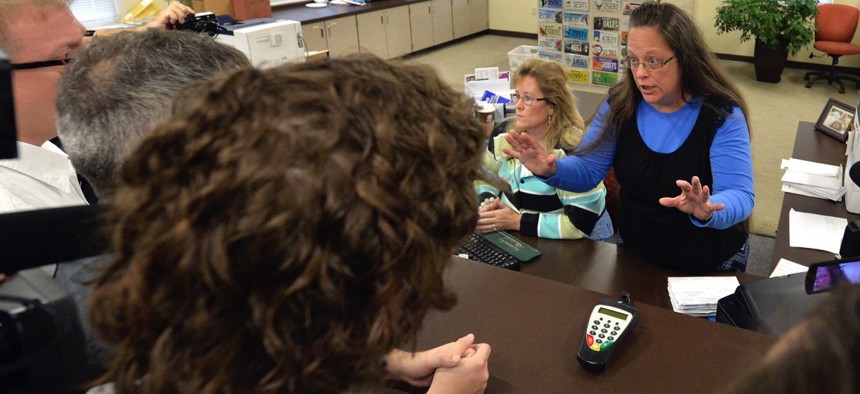Kentucky Clerk Still Says ‘No’ to Gay Marriage Licenses; Flint’s ‘Geography of Poverty’

Clerk Kim Davis explains to protesters her office's refusal to issue marriage licenses Tuesday at the Rowan County Courthouse in Morehead, Ky. Her appeal to the U.S. Supreme Court denied, Davis still refuses to issue licenses. Timothy D. Easley / AP Photo
Also: Bankruptcy and the future of energy in Texas and Common Core gets a rare break in Florida.
Here’s some of what we’ve been reading today …
ROWAN COUNTY, Kentucky: Kim Davis is still objecting to same-sex marriage on religious grounds in her official capacity as county clerk. She refused in June to issue state marriage licenses to gay couples after the U.S. Supreme Court legalized same-sex marriage, and she refused again Tuesday morning, just hours after the U.S. Supreme Court rejected an emergency petition she filed on Friday. Gay couples who want to get married in Rowan County are having none of it. April Miller and Karen Roberts came to the county clerk’s office for a license followed by dozens of television cameras, The New York Times reports. A deputy clerk told them the office would be issuing no marriage licenses at all today. That didn’t solve the problem.
A second couple, David Moore and David Ermold, rejected for a fourth time, demanded to speak with Ms. Davis. “Tell her to come out and face the people she’s discriminating against,” Mr. Ermold shouted … At first, Ms. Davis remained in her office with the door closed and blinds drawn, but she emerged a few minutes later, saying that her office would continue to deny the licenses “under God’s authority.”
The Times story features embedded tweets that include short videos from the scene. [The New York Times]
FLINT, Michigan: On Monday, MSNBC brought out the third installment of its web series on the “geography of poverty” in the United States. The series has seen reporter Trymaine Lee and photographer Matt Black bring the subject to life in an ambitious way that, with luck, might see the series become as influential among policy makers as it will likely become among digital journalists. The piece released Monday is on the Rust Belt and its “once mighty cities in decline.” The story begins in Flint, of course, across the street from a “fresh crop of working girls … any number [of whom] are addicted to drugs or hard living, bruised by life in a patchwork of post-industrial cities whose golden days are but a memory, if not a myth.”
“I won’t be in Flint for long,” one of the working women tells Lee. “If you want to do anything with life, you have to leave.” Not a cheery work of journalism. But really well done.
This is the third part in the four-part series. Previous installments have treated the Southwest and the Old South. The fourth and final installment will treat the Northwest, from the Dakotas to the Pacific Coast. [MSNBC]
AUSTIN, Texas: The enormous Energy Future Holdings bankruptcy case that threatens to shake up power delivery and hike bills in the Lone Star State is filling white boards and desktops in the offices of the state’s public utility commissioners, reports The Texas Tribune. Commissioners are trying to figure out “where billions of dollars in debt might finally land” as they “consider an unprecedented plan with huge implications for the electric grid and Texas ratepayers.” The case is being watched by states and energy-industry observers around the nation. It’s another sign that the utility industry may be deeply transformed in the coming years, as increasingly renewable and distributed power makes municipal dependence on monopoly companies a thing of the past. [The Texas Tribune]
TALLAHASSEE, Florida: Common Core school testing won a brief respite today from the unending string of bumps and bruises it is being delivered on what seems like daily schedule around the nation. As The Washington Times reports, administrators this past spring bungled the rollout of the “high stakes” Florida Standards Assessment, a new state test based on Common Core. As a result, there was some question about the reliability of scores notched by the 2.4 million students who took the test online. But an independent study conducted by the federal Department of Education released Tuesday found the scores valid. That’s the good news. The bad news is that, as The Times put it, “the study continues to raise serious questions about the test.” [The Washington Times]
BISMARCK, North Dakota: The bill to legalize drones weaponized with “non-lethal” weapons (pepper spray, tasers, rubber bullet guns?) is still making headlines since The Daily Beast and other publications wrote about it last week. Slate is alarmed, and so is the libertarian Heritage Foundation’s Daily Signal. “If anything, the utilization of weaponized drones should be reserved for extraordinary situations,” wrote the Signal’s Riley Walters. [Slate, The Daily Signal]
John Tomasic is a journalist based in Boulder, Colorado.
NEXT STORY: SBA helps cities put entrepreneurs on the fast track





